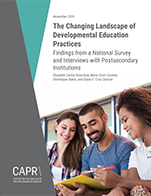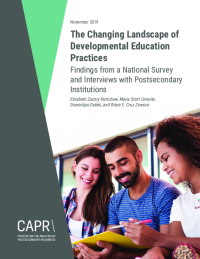The Changing Landscape of Developmental Education Practices
Findings from a National Survey and Interviews with Postsecondary Institutions

 Research has suggested that the traditional modes of delivering developmental education, or remedial courses designed to prepare students for college-level coursework, are ineffective and pose a significant barrier to college students’ success. To improve them, many colleges, education systems, and states are pushing to reform current developmental education practices. Recent state policies mandating or recommending these reforms suggest that change is happening at a rapid pace, but few studies have looked at the scope and scale at which colleges may be implementing these changes on the ground.
Research has suggested that the traditional modes of delivering developmental education, or remedial courses designed to prepare students for college-level coursework, are ineffective and pose a significant barrier to college students’ success. To improve them, many colleges, education systems, and states are pushing to reform current developmental education practices. Recent state policies mandating or recommending these reforms suggest that change is happening at a rapid pace, but few studies have looked at the scope and scale at which colleges may be implementing these changes on the ground.
To examine the reach and effectiveness of developmental education reforms, in 2014, MDRC and the Community College Research Center at Teachers College, Columbia University, established the Center for the Analysis of Postsecondary Readiness (CAPR), a research and development center funded by the U.S. Department of Education’s Institute of Education Sciences. As one of three primary studies in CAPR, this descriptive study documents current developmental education practices used in broad-access two- and four-year colleges across the country. The findings are based on a 2016 nationally representative survey of public two- and four-year colleges and private, nonprofit four-year colleges as well as qualitative interviews with institutional and state leaders. This report examines the current state of practices in developmental education assessment, placement, instruction, and support services offered to students.
The study finds that although many colleges are continuing to use standardized tests to assess college readiness and multi-semester, prerequisite developmental course sequences, they are also experimenting with changes to these practices. For instance, a growing number of public colleges are using additional measures, such as high school grades, to assess college readiness. Additionally, many colleges are implementing instructional reforms, with the most prevalent being compressing developmental courses into shorter periods, offering diverse math courses that align with students’ careers, allowing students to determine their own learning pace, and integrating developmental reading and writing instruction into one course. However, while experimentation is widespread, colleges are generally not offering these approaches at scale, with most of these reforms to developmental education instruction making up less than half of the college’s overall developmental course offerings. Finally, the report finds that college leaders tend to identify a variety of factors as influencing their efforts to improve developmental education, including faculty input, research, practices at other colleges, and the availability of resources. However, state policy, and how schools implement these policies, appear to have a particularly strong influence on colleges’ practices and the number of institutions that implement these reforms.







